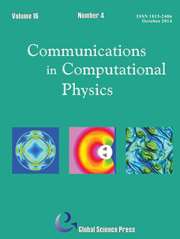Article contents
An Anisotropic Convection-Diffusion Model Using Tailored Finite Point Method for Image Denoising and Compression
Published online by Cambridge University Press: 17 May 2016
Abstract
In this paper we consider an anisotropic convection-diffusion (ACD) filter for image denoising and compression simultaneously. The ACD filter is discretized by a tailored finite point method (TFPM), which can tailor some particular properties of the image in an irregular grid structure. A quadtree structure is implemented for the storage in multi-levels for the compression. We compare the performance of the proposed scheme with several well-known filters. The numerical results show that the proposed method is effective for removing a mixture of white Gaussian and salt-and-pepper noises.
Keywords
- Type
- Research Article
- Information
- Copyright
- Copyright © Global-Science Press 2016
References
- 1
- Cited by


